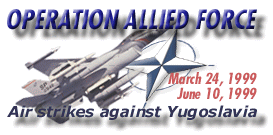Allied unity

Unity amongst allied countries
Regardless of official statements published during and after the air campaign, from the first to the very last day of the air strikes NATO had enormous difficulties getting and keeping all member states on one line, regarding the use of force. In BBC's Newsnight, August 20, 1999, Strobe Talbott — American Deputy Secretary of State — said "there would have been increasing difficulty within the alliance in preserving the solidarity and the resolve of the alliance" had Milosevic not given in on June 3, 1999. He added that "it was a good thing that the conflict ended when it did." Even without an invasion by NATO troops, it would have been difficult to remain united in a continued air campaign as NATO decisions are taken on the basis of consensus, i.e. all member states had to agree.
BBC reported that this meant that clear warnings from NATO military experts had to be ignored in the interests of consensus. General Klaus Naumann — then chairman of Nato's Military Committee — said he warned NATO leaders that "one has to be prepared to escalate, if one doesn't achieve the political objective with the first military actions." General Short commented after the campaign that consensus meant that NATO was fighting the war at the pace of the slowest member ("It was war by lowest common denominator"). In the BBC program "Moral Combat: NATO at war" Clark argued that the United States should have been in charge of the entire campaign.
Ground troops ruled out
There was a lot of criticism on the United States for ruling out the use of ground troops from day 1, though more countries were reluctant to endanger its soldiers. Months before the air war commenced in March 1999, on October 13, 1998, NATO members voted for approval of an air campaign against Yugoslavia.
The United State ruled out even planning for a ground war, a decision that it later tried to blame on the European members. When an agreement was reached in June 1999 and KFOR was ready to enter Kosovo the entire operation had to be postponed for 24 hours because US troops were not ready to go in. BBC reported that the reason for this was that "White House had refused to let them go ashore until it was absolutely clear they wouldn't have to fight their way into Kosovo."
Pause proposed
From the beginning of the war, some member states insisted on a pause in the raids. The United States and the United Kingdom ruled out any pause in the campaign and since their could be no consensus, a pause was rejected. France, Germany, Italy and Greece stated they were not prepared to escalate the strikes beyond certain limits set out on October 13, 1998.
Stategy abandoned
The air strikes originally consisted of three phases. On March 27 — on day 4 of the campaign — it was agreed to proceed to Phase Two, which included bombing Yugoslav forces and supply bases. The members that were not prepared to support escalation beyond the October 13 agreement, however, also stated they were not prepared to proceed to Phase Three, which included the bombing of power stations and strategic government buildings in Belgrade.
On March 30, however, Secretary General Solana, General Clark, and General Naumann informed NATO ambassadors that the phased campaign principle was abandoned, but that targets would be limited to strictly military objects. With this decision and the decision to extend the air strikes, reluctant members were effectively bypassed in order to win. The decision-making process, based on consensus, obviously did not lead to the best military results. It might raise the question what would have happened in an armed conflict during the Cold War.
BBC called the triumph of NATO a triumph of ruthless alliance management by Washington. In this case, the ends justified the means, at least according to the US. The air war simply had to be won. The alternative was a humiliating climbdown for NATO.
US condemned French vetoes
On October 22, 1999, BBC News reported that the commander of NATO air operation Allied Force criticized France for vetoing a number of attacks on targets. General Michael Short said that he believed a number of targets in Belgrade was legitimate, while France blocked striking these targets. He said pressure from the French, in particular, meant that for the first 11 days of the campaign, targets were almost impossibly tiny and had no strategic importance.
He also criticized the strategy of gradually increased pressure on Yugoslavia, while he preferred to start with a massive air strike on capital Belgrade.